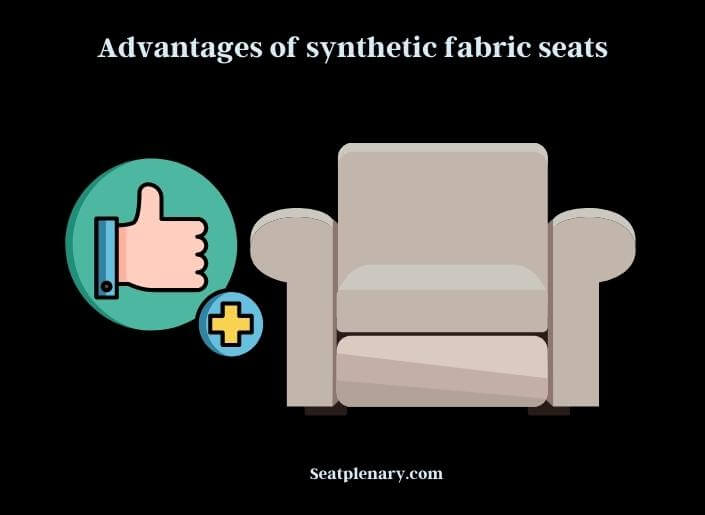Synthetic fabric seats have become increasingly popular in modern vehicles due to their durability, affordability, and easy maintenance. These types of seats are made from synthetic materials such as polyester, nylon, vinyl, and leatherette, which provide numerous benefits over traditional fabric and leather seats.

In the past, automotive seats were typically made from natural materials like leather or cotton. These materials were expensive and not as durable as their synthetic counterparts. As a result, many car manufacturers have turned to synthetic fabrics to meet the demands of consumers who want seats that are comfortable, long-lasting, and easy to care for.
Types of Synthetic Fabrics Used in Seats
A variety of synthetic fabrics are used in automotive seats, each with its own unique properties and advantages. Here are some of the most common types:
Polyester
Polyester is a popular synthetic fabric used in automotive seats due to its durability, resistance to stains, and affordability. It is also easy to clean and does not shrink or wrinkle easily, making it an ideal choice for car seats that see a lot of use.
Nylon
Nylon is another common synthetic fabric used in automotive seats. It is known for its strength, durability, and resistance to wear and tear. It is also lightweight and easy to clean, making it a good option for seats that are exposed to spills and stains.
Vinyl
Vinyl is a synthetic material that is often used in place of leather in car seats. It is less expensive than leather but provides a similar look and feel. Vinyl is also water-resistant, making it ideal for seats that are exposed to moisture.
Leatherette
Leatherette, also known as faux leather or synthetic leather, is a synthetic material made to look and feel like real leather. It is durable, easy to clean, and less expensive than genuine leather. Leatherette is also more resistant to fading and cracking than real leather, making it a popular choice for automotive seats.
Advantages of synthetic fabric seats
Synthetic fabric seats offer a number of advantages over traditional fabric and leather seats. Here are some of the main benefits:

Durability
Synthetic fabrics are known for their durability and resistance to wear and tear. Unlike natural fabrics, synthetic fabrics do not fray, tear or wear out as easily, making them ideal for car seats that see a lot of use.
Stain Resistance
Synthetic fabrics are often treated with a stain-resistant coating, which makes them resistant to spills and stains. This means that spills can be quickly wiped up without leaving permanent marks or stains on the seats.
Easy to Clean
Synthetic fabrics are also easy to clean and maintain. Most synthetic fabrics can be cleaned with just soap and water, making them a convenient choice for car owners who want seats that are easy to care for.
Cost-Effective
Synthetic fabrics are generally less expensive than natural materials like leather, making them a cost-effective choice for car manufacturers and consumers alike.
Color and design options
Synthetic fabrics offer a wide range of color and design options, allowing car manufacturers to create unique and attractive interiors. This means that car owners can choose from a variety of colors and patterns to customize their vehicles.
Environmental Friendliness
Synthetic fabrics are often made from recycled materials, which can make them a more environmentally friendly choice than natural materials like leather or cotton. In addition, synthetic fabrics can be recycled at the end of their life, reducing waste and environmental impact.
Resistance to Fading
Synthetic fabrics are often treated with UV inhibitors, which protect them from fading and discoloration caused by prolonged exposure to sunlight. This means that car seats made from synthetic fabrics will maintain their color and appearance for longer, even in sunny or hot climates.
Disadvantages of Synthetic Fabric Seats
While synthetic fabric seats offer numerous benefits, they do have a few disadvantages.
Heat Retention
Synthetic fabrics are known for their tendency to retain heat, which can make car seats uncomfortable on hot days. In contrast, natural materials like leather or cotton tend to be more breathable and can provide better ventilation.
Static Electricity
Synthetic fabrics can generate static electricity, which can be uncomfortable for passengers and may even cause electrical interference with electronic devices. This can be mitigated by using anti-static treatments or by using natural materials in certain areas of the car.
Environmental Impact
While synthetic fabrics can be made from recycled materials, their production can still have an environmental impact. The manufacturing process for synthetic fabrics can be energy-intensive, and the disposal of synthetic fabrics at the end of their life can contribute to waste and pollution.
Perception of Quality
Some consumers perceive synthetic fabrics as being of lower quality than natural materials like leather. This perception may impact the resale value of a vehicle with synthetic fabric seats, as some buyers may prefer leather or other natural materials.
Odor Retention
Synthetic fabrics are known to retain odors more than natural materials. This can be a concern for car owners who smoke or have pets in their vehicles, as the odors may become trapped in the fabric and be difficult to remove.
Comfort
While synthetic fabrics can be designed to be soft and comfortable, some car owners may prefer the feel of natural materials like leather or suede. Synthetic fabrics may also be less breathable than natural materials, which can make them less comfortable in hot or humid weather.
Flammability
Some synthetic fabrics are more flammable than natural materials, which can be a safety concern in the event of a fire. Many synthetic fabrics used in car seats are treated with fire-resistant chemicals to mitigate this risk.
Maintenance and Care of Synthetic Fabric Seats
Proper maintenance and care can help synthetic fabric seats retain their appearance and durability for many years.

Vacuum Regularly
Vacuuming the seats regularly can help remove dirt, debris, and dust that may accumulate on the surface of the fabric. This can prevent the fabric from becoming discolored or stained over time.
Spot Clean Spills and Stains
If spills or stains occur, it’s important to clean them up as soon as possible to prevent them from setting into the fabric. Use a mild cleaning solution and a soft brush or cloth to gently clean the affected area, and be sure to rinse the fabric thoroughly to remove any residue.
Avoid Harsh Chemicals
Harsh chemicals like bleach or ammonia can damage synthetic fabrics, so it’s important to avoid using them when cleaning the seats. Instead, use mild detergents or cleaning solutions that are specifically formulated for synthetic fabrics.
Use Fabric Protectants
Fabric protectants can help repel water and stains, making it easier to clean spills and stains from the seats. Apply a fabric protectant according to the manufacturer’s instructions, and reapply it periodically to maintain its effectiveness.
Are Synthetic Fabric Seats as Durable and Elegant as Leatherette Seats?
Synthetic fabric seats may mimic the extravagant appearance of leatherette seats but fall short in terms of durability and elegance. Although they offer affordability, synthetic fabrics lack the resilience and premium feel of genuine leatherette upholstery. Whether it’s the luxurious aesthetics or long-lasting performance, leatherette seats stand out as the superior choice for those seeking durability and elegance in their car interiors.
Avoid Excessive Heat and Sunlight
Excessive heat and sunlight can damage synthetic fabrics, causing them to fade or become brittle over time. To prevent this, park the car in a shaded area whenever possible, and use window shades or covers to protect the seats from direct sunlight.
Conclusion
Synthetic fabric seats offer numerous benefits for car owners, including affordability, durability, and stain resistance. They also have some disadvantages, such as heat retention and environmental impact, that should be carefully considered when choosing the type of fabric for a vehicle’s seats.
Despite their drawbacks, synthetic fabric seats can be an excellent choice for car owners who prioritize affordability, easy maintenance, and durability. By following proper care and maintenance guidelines, car owners can ensure that their synthetic fabric seats remain clean, comfortable, and attractive for many years.
